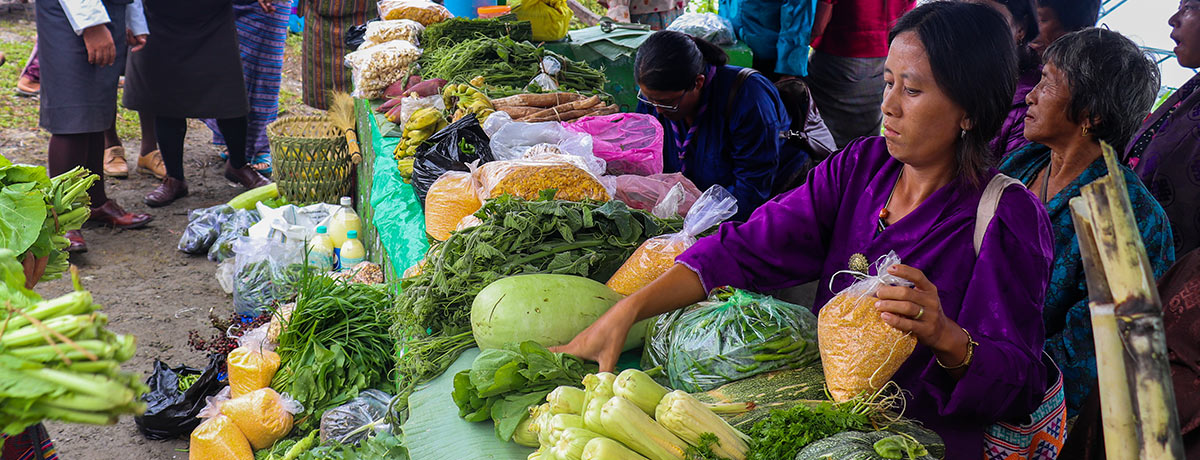Project Goals:
Enhance food security, self-sufficiency, and income generation opportunities in a sustainable way through the implementation of organic agriculture practices.
Organic farming strengthens all four pillars of Bhutan’s holistic Gross National Happiness development policy:
Building a resilient farming community involving out of school youth and with a good network of committed lead farmers, seed self-reliance, promotion of local seeds, local breed of crops (drunagu) and livestock, composting and bio-pest management, integrated farming, development of knowledge product (focus on traditional farming and food systems) and diversification of secondary goods from farm produce is the cornerstone of SJI’s OA program.
Samdrup Jongkhar Initiative intends Samdrup Jongkhar to become Bhutan’s first large fully organic region.
To this, SJI works to document and disseminate valuable practices that conserve the local agrobiodiversity and are fundamental to the sustainable and secure food growth in the area, as well as for the local economy and social capital. In order to disseminate the best organic methods and demonstrate their productivity and economic viability, SJI develops local capacity by partnering with several local and regional institutions. India’s largest organic, fair trade network, Navdanya; India’s Organic Farming Association; Bhutan’s Ministry of Agriculture, Royal University of Bhutan’s College of Natural Resources; and India’s Barli Development Institute for Rural Women are examples of such partnerships that allowed for SJI to develop local organic farming initiatives in several ways: training hundreds of local farmers, sending lead farmers and local government’s agriculture officers to regional trainings, forming vegetable groups which are provided technical assistance also on business and marketing, promoting local procurement of produce by local schools and monasteries.
In addition, SJI is concerned with the loss of cereal diversity and the seasonal shortage of food, but also focuses on resource conservation activities such as development and encouragement of community participation in variety selection and conservation through the creation of a seed bank, and the creation and maintenance of diversified organic vegetable gardens, to mention a few examples. In short, we see food security as a challenge that provides us with the opportunity to programmatically enhance our work on Organic Agriculture.
- Inauguration of Dungsam Community Seed Bank – Enhancing Food Security
- Reviving the Paddy Cultivation : 15/7/2017
- Inculcating the Values of Farming : 10/7/2017
- In Progress : 6/7/2017
- Visit to Assam (SRI) : 24-25/6/2017
- SRI Project : 20/5/2017
- Prospective Lead Farmer’s Exposure visit: 15-20/5/2017
- Visit to Phueluma : 14/5/2017
- SJI and farmers at international Agri-Horti Show, Guwahati, Assam: 16/01/2017
- System of Rice Intensification (SRI) Crop Cut Day : 14/11/2016
- SRI crop cut: 13th November,2016
- Trial SRI Paddy Field-continued story of 4th October, 2016: 9th october,2016
- SRI trial farm: 4th October,2016
- Paying farmers to go organic: 19th July,2016
- SRI is being piloted at Rekhay for the first time; 5th July,2016
- Construction of mini tank for Bongtere vegetable group:22nd April, 2016
- Lead farmer training: 11th March, 2016
- Basic seed saving: 2nd February,2016
- Training on soil conservation, seed saving, fungus and compost making in Menchari: 5th January, 2016
- A continuing Journey towards self-reliance: 26th November to 9th December,2015
- Offering of manure for the Ludrong memorail garden in Thimphu: 3rd November,2015
- Farmers training farmers: 2nd November, 2015
- The basics of saving seeds. Jan,2016
- SRI Pilot Impact Area, April, 2015
- Cash Crop Pilot Impact Area, April, 2015
- Agro-forestry Pilot Impact Area, March, 2015
- Soil Conservation Pilot Impact Area, March 2015
- Agriculture Working Paper, 2011-2015.
- Agriculture Research Outcomes, 2011-2015
- Cow Feed Tutorial, 2014
- Pit Compost Tutorial, 2014
- Cover Cropping Tutorial, 2014
- Solar Drying in Lauri
- Making a commitment to Organic Agriculture,March 12, 2011
- A report on OFAL and SJI organic Farming, PGS and farmer Cooperative workshops: Feb 17- Feb 28, 2011


